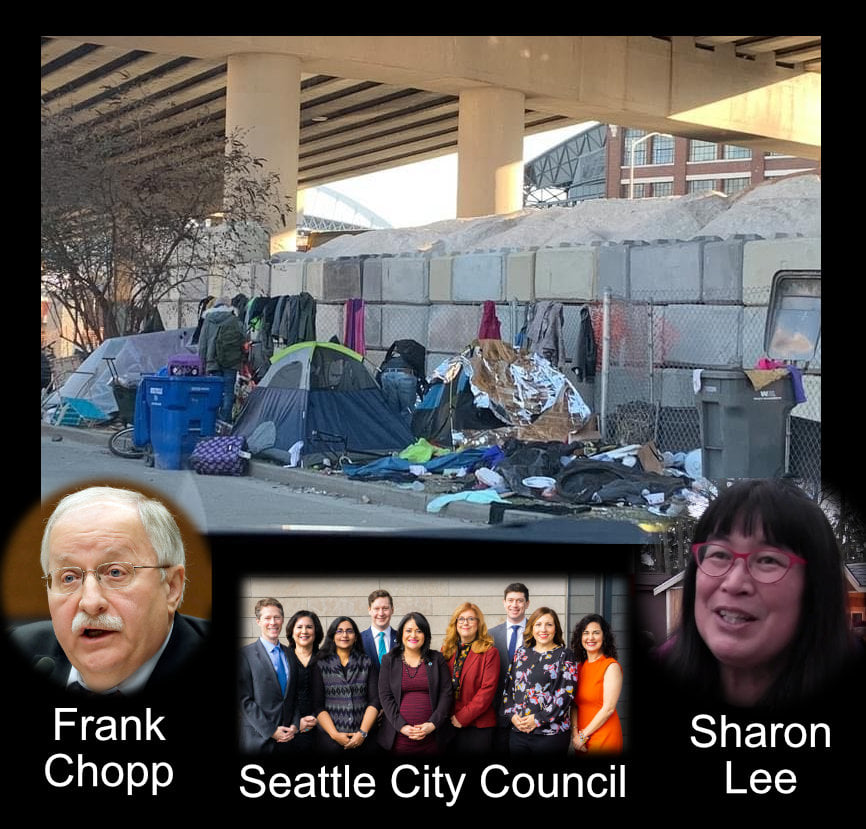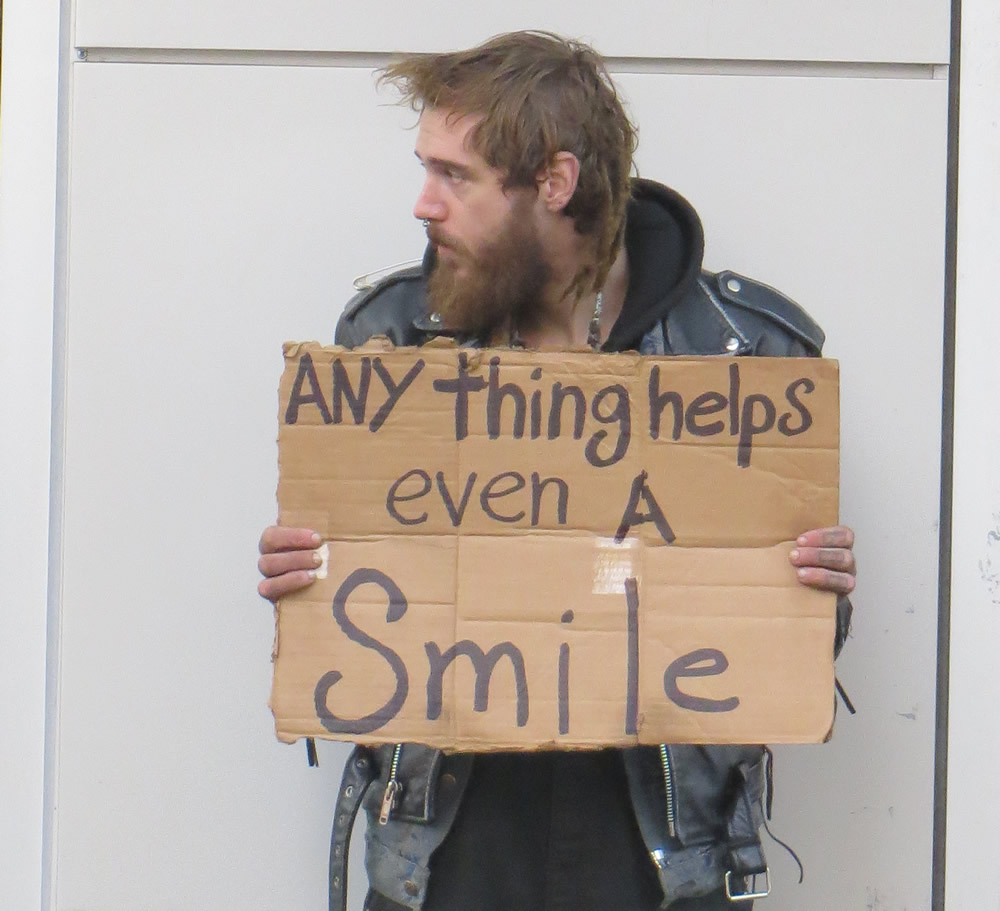It is difficult to get a man to understand something when his salary depends upon his not understanding it. –Sinclair Lewis
This image of homeless tents against the backdrop of lavish sports stadiums near downtown Seattle reminds me of a scene one might find in a documentary on growing pains in the developing world, where the skyscrapers of a Shanghai or Rio de Janeiro float mirage-like in the distance above acres of squalid shanty towns.
Whence comes this contradiction of extreme wealth and extreme poverty? Leftists say it’s all about structural inequality and resource distribution, and while that’s one of the reasons, I would submit that a greater one is corruption. Wherever you see a slum and skyscrapers side by side, you’ll find a government that has the material resources to resolve the contradiction but doesn’t because its been “captured” by a caste of self-interested bureaucrats.
Corruption isn’t unique to the one side of the political spectrum; it looks and acts the same under left-wing or right-wing regimes. The determining factor for corruption is not the particular ideology a regime espouses but rather the will of the citizenry to resist it and the tools they have with which to do that. A tradition of strong democratic institutions like Seattle’s is a good bulwark, yet even a strongly democratic society can be subverted insidiously, especially when that society is subjected to a series of tectonic culture shocks.
Over the course of its life as a major city, Seattle has had a well-educated and politically engaged middle class, a strong tradition of respect for democratic institutions, and a low tolerance for political corruption. Ironically, these safeguards began to undermined as a wave of successive tech revolutions brought a massive influx of wealth and tax revenue into the region. Along with the stampede of tech-money tycoons has come a real increase in wealth disparity, made more apparent by the arrival of tens of thousands of homeless people from outside the region, many of them severe impediments to being housed or gainfully employed. Critics of the tech boom point to these destitute souls as proof that the wealthy are driving up rents and putting people out of their homes. Although some of the destitute were forced out by rising costs, most weren’t. Dozens of news interviews of Seattle’s street people have them saying they came here from other states. Meanwhile there is no scientifically gathered evidence showing that a large number of the homeless were living here securely before being priced out of the market.
The putative homelessness crisis has given rise to a legion of leftist activists and politicians, who promised to solve the crisis by raising taxes on the wealthy to pay for subsidized housing units. Their promises to tax the rich and build housing haven’t panned out, but despite this, their influence has expanded to the point where they have captured Seattle and King County government and are well on their way to taking over the whole state.
The leftists have achieved this coup by speaking a language that voters understand – the language of equality and compassion – and by allying themselves with the non-profit housing sector, which, in the last three decades, has leveraged federal investment tax credits and gifts of public land to forge a real-estate empire worth tens of billions of dollars. The alliance between leftists and the low-income housing sector is personified in one of Washington’s longest-serving and most powerful politicians: Frank Chopp, who cofounded two of the largest housing and social services operations in the state: the Low Income Housing Institute (LIHI) and Solid Ground. As Washington’s Speaker of the House for 17 years, Chopp controlled committee assignments and steers legislation, which allows him to guarantee a continuous flow of millions of dollars in federal and state tax money to the organizations he founded… and in all likelihood still controls.
Seattle officials could get all the homeless people off the street in a year if they chose to, through a combination of enforcing nuisance and drug laws, providing compulsory drug and mental health treatment, and building low-cost but effective shelters. But ending the “crisis” is the furthest thing from their minds, since the homeless services empire and the leftist political regime it supports would necessarily end along with it. So instead, the leftists do the opposite of ending the crisis: they inflame it. By defunding police, relaxing drug laws even further, and by not enforcing nuisance and trespassing laws. This attracts still more homeless and jobless people from other states, who make it appear that the “crisis” is worse than ever and therefore needs even more tax money to be raised (from billionaires or the middle class, whoever puts up less resistance) in order to fix it. Having a permanently visible population of homeless people on the streets, in tents, and in RVs ensures that each time the leftists and their social service allies go to the taxpayers with their hands out, they will be rewarded with still more money, land, and political favors, all in the quixotic effort to “end homelessness.”
This corrupt cycle would bankrupt many another large city and local politicians would be tossed out on their ears in short order, but that hasn’t happened in Seattle. Why? Because, up until recently, the city council has had hundreds of millions of dollars in tech boom mad money to play with, so it hasn’t had to lean hard on sales and property taxes to finance its projects. But that’s now changing. As the tech giants leave town or expand their operations elsewhere, the once seemingly endless corporate revenue stream begins to dry up, and sales and property tax hikes are imposed cover the gap. These regressive taxes have been piling up on the backs of middle-class citizens to the point where they are now enough of a burden on some people to cause them to move out of the area, shrinking the tax base even further as they do.
One might wonder why voters haven’t become fatigued with the incessant begging and broken promises from their elected leaders. It’s largely because in spite of all the betrayals, Seattle voters, like the true believers they are, remain naive and disengaged, unwilling to demand better choices at the ballot box and disinclined to do much beyond voting, complaining… or leaving.
For now, “progressive” Seattle voters aren’t willing to do the hard work of looking at the data and rethinking their assumptions about the people running the show at city hall. They are uninterested in the question of why the “tiny house villages” going up around the city aren’t followed by a decrease of the number of tents in the park. Nor do they particularly care that the woman who oversees the tiny house village network (LIHI’s Sharon Lee) is making over $200,000 a year. As long as her group is doing something to address income inequality and help the homeless, that’s good enough for them.
The local press furthers the leftists’ designs by showcasing all the good work they do, while ignoring the question of why it doesn’t seem to be helping. There have been hundreds of soft-focus news pieces and op-eds about citizens befriending a homeless person or dropping off Christmas presents for children at homeless camps, but there have been no reports about influence peddling by homeless camp operators at city hall and no serious investigations into where Seattle’s homeless denizens are really coming from or why they’re here. Maybe our local news outlets simply don’t have the investigative muscle to tell this story. Or maybe they lack the character to question a status quo that they helped create.
If you asked the average Seattleite how they can tolerate so much political corruption in their city, they’d give you a bemused look and say, “What corruption?” And if you asked them what they know about the connections between LIHI’s executive director Sharon Lee and past and present city councilmembers they’d shrug their shoulders and go, “Who?”
Ultimately it’s the naive faith by the electorate in their leaders that explains why, in the midst of so much splendor, there is so much squalor.
–David Preston
Did you appreciate this article? Do you support honest journalism? Then please …
Tent camp photo in first picture: Mildred
Photo of panhandler with sign: David Preston
Photo of vagrant with finger: Anonymous
























